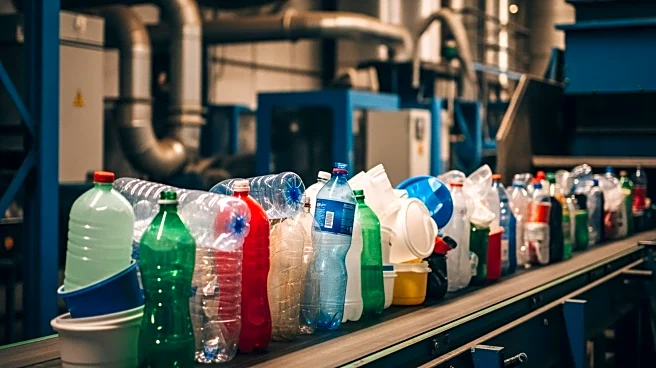What's Happening?
The plastic recycling industry is facing significant challenges, with numerous plant closures across Europe and the U.S. due to high energy and labor costs, and the low price of virgin plastic. Companies
like Biffa and Viridor have closed several plants, while others have abandoned plans for new facilities. Despite these setbacks, some companies are investing in new technologies and facilities. Enviroo, for example, has secured funding to build a recycling plant in England, and Plastic Energy is converting plastic waste into pyrolysis oil. However, industry experts warn that without decisive political action, the recycling industry may become dependent on unsustainable imports.
Why It's Important?
The struggles of the plastic recycling industry have broader implications for environmental sustainability and economic resilience. The closure of recycling plants reduces the capacity to process plastic waste domestically, potentially increasing reliance on imports and contributing to environmental degradation. This situation underscores the need for regulatory reforms and investment in recycling infrastructure to support a circular economy. The industry's challenges also highlight the importance of aligning business practices with environmental goals, as companies face pressure to meet recycled content targets and reduce waste.
What's Next?
The UK government is considering reforms to support domestic recycling, including a single plastic recycling certification scheme and the Deposit Return Scheme. These initiatives aim to reduce plastic waste exports and encourage the use of recycled materials. Industry stakeholders are advocating for policy changes to make recycling more economically viable and to promote a circular economy. As these discussions progress, the industry may see increased investment in innovative recycling technologies and infrastructure.
Beyond the Headlines
The challenges facing the plastic recycling industry reflect broader issues in global waste management and environmental policy. The dependence on exporting plastic waste and the use of virgin plastic highlight the need for systemic changes in how materials are sourced and processed. Ethical considerations around waste management and resource use are becoming increasingly important, influencing consumer behavior and regulatory frameworks. As the industry navigates these challenges, collaboration between governments, businesses, and civil society will be crucial to achieving sustainable solutions.










